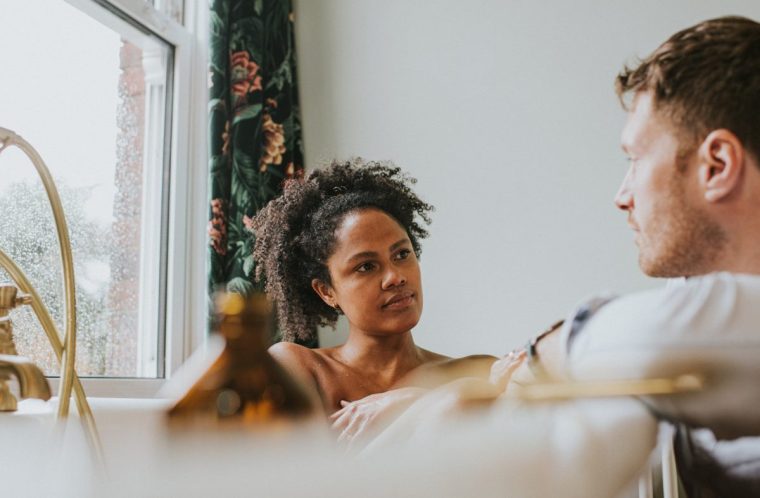Good communication is the bedrock of any happy relationship. It doesn’t matter how long you have been with your partner, known your friend, or dealt with a difficult parent or monosyllabic teenager – a lack of open, healthy communication will never end well. And while being perfectly communicative is easier said than done, there are simple ways you can improve it.
Here, Dr Elena Touroni, a consultant psychologist and co-founder of The Chelsea Psychology Clinic, shares eight communication hacks that are easy to pick up – and will leave every relationship happier.
Ask open-ended questions
“If you feel as though you barely talk, despite seeing each other regularly and having some kind of exchange every time you do, it might be because you are asking the wrong kind of questions. Instead of closed questions that yield ‘yes’ or ‘no’ answers, use open-ended questions such as ‘how do you feel about…?’ or ‘What’s on your mind about…?’ Open questions make for happier relationships because they encourage partners to share more, fostering deeper, more meaningful dialogue. Asking these types of questions signals genuine interest, creating a sense of emotional closeness and giving your partner the chance to express themselves fully, which ultimately strengthens the connection.”
Practise “soft start-ups”
“It can be tricky to talk about things that are impacting the relationship without it spiralling into conflict. When bringing up sensitive issues, start gently rather than diving straight into whatever it is you want to talk about. For example, something like ‘I’d like to talk about something that’s been bothering me a bit’ sets a softer tone than ‘We need to talk about your behaviour.’ Research shows that starting with a gentle tone can prevent defensiveness and encourage more collaborative problem-solving. Soft start-ups lead to better outcomes because they show respect and kindness, setting a positive tone for the conversation.”
Have difficult conversations side-by-side
“Another way to deal with difficult issues is to think about body language. Sitting side-by-side, rather than face-to-face, can make challenging discussions feel less confrontational. For instance, talking during a walk or sitting on a park bench allows both of you to focus outward, reducing the pressure of intense eye contact. Research shows that parallel positioning can help reduce stress and defensiveness, making it easier to tackle difficult topics calmly. Plus, the act of moving or sharing an activity can help everyone feel more relaxed, leading to a more open, compassionate conversation.”

Paraphrase before responding
“Active listening is one our best communication tools. So, when you are having a discussion, before sharing your own thoughts, paraphrase what they have just said to show you have understood them. This can be as simple as ‘So you are saying that…’ or ‘It sounds like you feel…’ Paraphrasing helps ensure clarity, shows you are actively listening, and gives your partner, friend or family member a chance to correct any misunderstandings before they snowball. It also reassures them that their feelings are genuinely being heard, creating a stronger foundation of trust and empathy.”
Use a “timer” for grievances
“It is normal for grievances to arise in any relationship. How you deal with them will be the difference between them creating proper conflict. Setting a short timer, such as five minutes, for each person to express their frustrations uninterrupted can help ensure that both feel heard without the conversation turning into a prolonged conflict. Agree in advance that neither person will interrupt, even if they disagree, which creates a safe space for honest expression. This technique encourages both people to listen fully and helps avoid back-and-forth arguments. When you feel genuinely listened to, solutions become more collaborative and less confrontational.”
Use “I” statements
“Also, when discussing difficult topics, start with ‘I’ rather than ‘you.’ Saying ‘I feel’ or ‘I need’ rather than ‘You never’ or ‘You always’ helps you express your feelings without placing blame, making it easier for them to understand your perspective without feeling defensive. For example, ‘I feel unappreciated when tasks aren’t shared’ sounds less accusatory than ‘You don’t help enough.’ This approach fosters empathy, encourages open dialogue, and reduces tension, creating a more constructive space for resolving issues.”

Embrace the power of pauses
“Taking intentional pauses during a conversation allows for time to process what is being said. This could mean taking a moment after your partner or friend speaks, or pausing when emotions run high. Simply saying, ‘Let me take a second to think about that’ helps avoid knee-jerk reactions. Pausing promotes mindful responses rather than impulsive ones, making it easier to communicate thoughtfully and avoid saying things that might escalate conflict.”
Cultivate a habit of daily appreciation
“Expressing some kind of gratitude every day, even for small gestures, can transform the tone of a relationship. Phrases like ‘Thank you for cooking dinner’ or ‘I really appreciate your support’ reinforce positive behaviour and make the person feel valued. Studies show that gratitude strengthens bonds and enhances overall satisfaction by shifting focus to the positive aspects of the relationship. This habit creates a foundation of mutual appreciation, not only making the relationship happier on the whole but also making it easier to tackle challenges when they arise.”


'President Musk' is flexing his muscles and revealing how weak Trump is